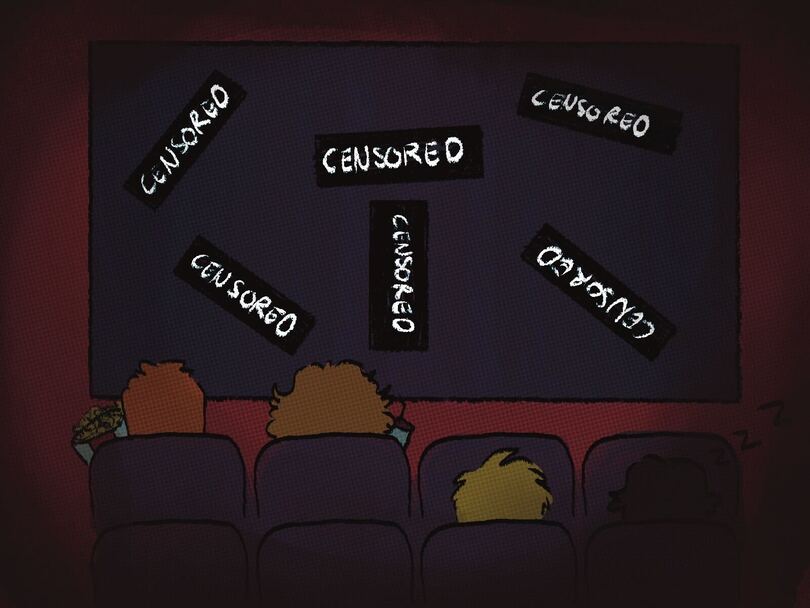Opinion: We must not be silenced by Trump’s group attack on free speech

Our columnist writes President Donald Trump’s so-called “free speech absolutism” applies only to favorable language. His lawsuits and cancellations threaten the free press, pushing America deeper into failing First Amendment rights. Sarah Yudichak | Contributing Illustrator
Get the latest Syracuse news delivered right to your inbox.
Subscribe to our newsletter here.
During President Donald Trump’s inauguration speech this past January, he proclaimed that his second term was the beginning of “The Golden Age” in America. He made promises of economic prosperity and governmental transparency, vowing to drastically roll back government suppression as a champion of free speech.
“I will also sign an executive order to immediately stop all government censorship and bring back free speech to America,” Trump emphasized.
Now, eight months into Trump’s second term, he’s attempted to sue The Wall Street Journal, Paramount, The New York Times and ABC over claims of defamation, deception and damage pertaining to his election chances.
Recent cancellation of The Late Show with Stephen Colbert and Jimmy Kimmel Live! raise some major questions regarding the sanctity of the First Amendment under this administration.
Kimmel’s show got pulled after the comedian commented that the shooting of political influencer Charlie Kirk’s “MAGA gang” was “desperately trying to characterize this kid who murdered Charlie Kirk as anything other than one of them.”
Naturally the decision to indefinitely pull Kimmel’s show led to public outrage over the “guidelines” of free speech.
Trump declared on a Truth Social post that the cancellation was “Great News for America.”
Companies such as Nexstar and the Sinclair Broadcast Group own many ABC affiliate broadcasts in Syracuse. Following Kimmel’s comments on Kirk, both companies swiftly pressured ABC to suspend the show. ABC answered their calls and those of many others, “indefinitely” pulling the show.
It’s very uncommon for local news stations to have such influence over a company like ABC.
“I can’t imagine another time when we’ve had local broadcasters tell what we call a national programmer like Disney that your content no longer meets the needs and the values of our community,” FCC chairman Brendan Carr stated.
As political polarization proliferates in our country, smaller channels will have more influence regarding the political message of the programs.
Stephan Colbert had an exit akin to that of Kimmel. Three days following Colbert’s criticism of the Paramount settlement, his Late Night Show was canceled by CBS for “financial reasons.” This is further proof of the Trump administration’s ability to fearmonger the press, turning their outlet into a weapon they can use to further divide our country politically.
Trump’s attitude of defending free speech only when it benefits him is nothing new. With the Democrats having limited influence in Congress, he has a clear path to abolish the First Amendment, and that’s exactly what he’s trying to do.
On the very same day as Trump’s inauguration, the White House hypocritically claimed that the Biden administration “trampled” free speech rights.

Sophia Burke | Digital Design Director
The previous administration was “exerting substantial coercive pressure on third parties, such as social media companies, to moderate, deplatform, or otherwise suppress speech that the federal government did not approve,” it stated.
Unlike Trump, former President Joe Biden did not sue any media organizations for defamation or for hurting his chances in the 2020 election.
Trump’s second-term actions have shown that we’ve moved further from the First Amendment than we’ve ever been. On Sept. 15, he decided to bring a lawsuit against the New York Times claiming a series of “critical articles” were “specifically designed to try and damage President Trump’s business, personal and political reputation.”
It’s obvious Trump’s “free speech absolutism” applies only when he approves of said speech and not when he’s faced with any political adversity.
Similarly, Trump brought a lawsuit against Paramount Global in October of last year, alleging the program “60 Minutes” was editing interviews to “deceive” their viewers.
These defamation lawsuits have become a common trend and serve as a perfect example for President Trump’s conveniently subjective stance on free speech. The suit resulted in a settlement requiring Paramount to pay $16 million, covering his legal fees and contributing money to his upcoming presidential library.
Using the fear of legal and financial penalties, this administration can control what messages the media puts out. Many of the lawsuits levied against these media outlets fall under a similar type of accusation – mainly defamation and deception – and these allegations are enough to ward off organizations who don’t want to deal with the financial burden of combatting said claims.
The fall of the First Amendment would almost certainly spell the end of our democracy. Without freedom of speech, religion, press and assembly, our ability to voice our opinions is effectively splintered.
The media organizations bending to Trump’s every word must be held accountable as well. Trump doesn’t have complete authority over these companies. They are choosing to settle and not fight back, fearing a hit to their finances.
These lawsuits and cancellations are a warning sign for the dark times to come. Regardless of how you view the Trump administration, their actions should worry you. We’re seeing constitutional infringements on a level unprecedented in American history. We need to start fighting for our voices before we lose them.
James Reed is a freshman studying political science. He can be reached at jcreed@syr.edu.




